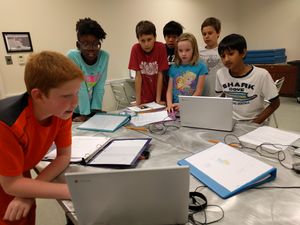Power Tools
Power Tools are expectations and practices for establishing group norms that foster collaborative, positive interactions. Mentors should introduce these Power Tools at the beginning of the semester and reinforce them during each session so that everyone not only understands how to use them but collectively commits to using them regularly.
Contents
Brain Breaks
Brain Breaks are quick ways of changing the physical and mental state of the students. They can help energize the students when they seems to be loosing focus or feeling stressed. The students may not have the attention span necessary for two hours of uninterrupted learning. Through simple physical activities, the students become re-energized and prepared to refocus on learning.
Give Me Five
"Give Me Five" is a great way to empower students to lead. When someone shouts, "Give me five!" everyone in the room stops what they are doing, faces the speaker, holds up their outstretched hand, and listens intently to their message. This gives the student the attention of the entire group, even instructors. One of the most common uses for "Give Me Five" is to share a discovery, demonstrate a useful skill, or make a suggestion with regard to a task the group is working on. Students can also use "Give Me Five" to ask the whole group a question when no one knows the answer. Note that mentors should only answer questions after a student's peers have had a chance to answer. [1]
Mentors may also use "Give Me Five" to get the attention of entire team. He or she may want to demonstrate a concept that would be useful to everyone or give a reminder about what's coming up next in the session agenda.
NOSTUESO
Pronounced No-stew-ess-oh , this means "No One Speaks Twice Until Everyone Speaks Once" . Ideally, every student will participate and share ideas, questions, and comments during group discussions; however, sometimes certain students may be more vocal than others. With this Power Tool, each group member must share his/her thoughts before anyone can comment again. NOESTUESO provides the space for quieter students to speak up and encourages more talkative students to prioritize their feedback and input. [2]
Ask Three Before Me
When students come across difficulties, tell them, “Ask 3 then me.” Ask 3 peers, and if they don’t have the answer, then ask the mentor. This Power Tool encourages critical thinking and team problem solving, while building students' communication and collaboration skills. The mentor won't always be there to give answers. Learn more about building a collaborative team.
Rubber-duck debugging
"When you're stuck, ask the duck!" - Ben Davis
Rubber duck debugging is an informal term used in software engineering for a method of debugging code. The name is a reference to a story in the book The Pragmatic Programmer in which a programmer would carry around a rubber duck and debug their code by forcing themselves to explain it, line-by-line, to the duck. Many other terms exist for this technique, often involving different inanimate objects.
Many programmers have had the experience of explaining a programming problem to someone else, possibly even to someone who knows nothing about programming, and then hitting upon the solution in the process of explaining the problem. In describing what the code is supposed to do and observing what it actually does, any incongruity between these two becomes apparent. More generally, teaching a subject forces its evaluation from different perspectives and can provide a deeper understanding. By using an inanimate object, the programmer can try to accomplish this without having to interrupt anyone else. [1]
Unplugged Games
Unplugged games (meaning without a computer) introduce or reinforce computer science concepts through engaging games and puzzles that use cards, string, crayons and lots of running around. Many times they present a concept in a way that is relatable to younger ages, separated from the distractions and technical details of having to use computers. Importantly, no programming is required to engage with these ideas!
See Unplugged for an extensive list of activity ideas.